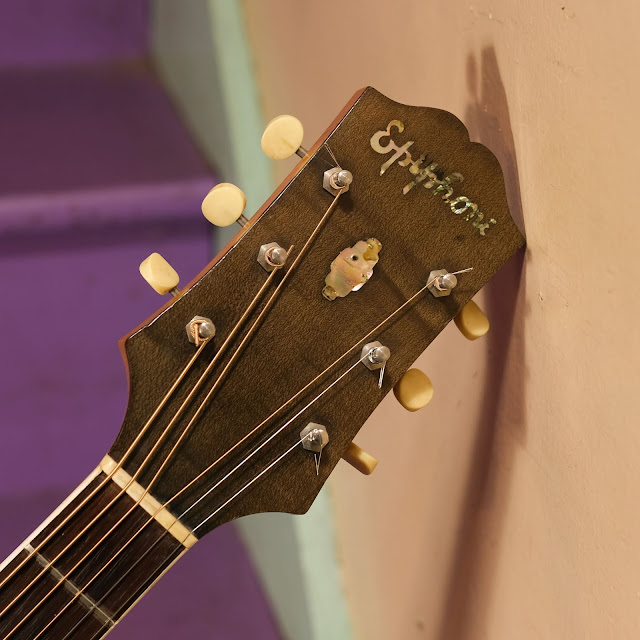1947 Epiphone Blackstone Carved-Top Archtop Guitar
Dang, folks, this is probably the cleanest old Epiphone archtop I've ever seen. A local customer dropped it off for consignment and it's a beaut. It's also in the elusive, gorgeous, natural finish that most of these don't have. It's a big, curvy, blonde to be exact! Women readers may now spit on my name.
1940s Epiphone (New York-made) carved-tops have always been my favorites -- with wartime and just-postwar being among their best production guitars in my opinion. They've got great pop, punch, and cut with a good, velvety, chunky low-end. The long scale makes them snappy and precise, too -- perfect for trad-jazz styles, blues, and "vintage popular" material -- an especially good sound for someone who plays a lot of lead or fill lines as well as chucks chords.
This guy's crack-free, original save its bridge, super-clean, and even has its original hard case.
Repairs included: fret level dress, setup, etc.
Made by: Epiphone
Model: Blackstone (natural)
Made in: New York City, NY, USA
Serial number: 56944
Top wood: solid spruce
Back & sides wood: ply flamed maple
Bracing type: tonebar
Bridge: rosewood (replacement)
Fretboard: rosewood
Neck wood: (update) Epi expert Dave says yellow birch, and I'm with Dave!
Tone: clean, precise, punchy, velvety/percussive bass, loud
Action height at 12th fret: 3/32” bass 1/16” treble (fast, spot-on)
String gauges: 54w-12 lights
Neck shape: medium C/V
Board radius: ~7"
Truss rod: adjustable (at fretboard extension)
Neck relief: straight
Fret style: medium-low
Scale length: 25 1/2"
Nut width: 1 5/8"
String spacing at nut: 1 3/8"
String spacing at bridge: 2 1/8"
Body length: 20 1/8"
Body width: 16 1/4"
Body depth: 3 3/8" +arching
Weight: 5 lb 4 oz
Condition notes: this one's absurdly-clean. It has a few light scratches here and there and a tiny amount of pickwear on the upper bout, but the original finish is in great shape and gleams. It also appears all-original save the bridge. The tailpiece might be a replacement, too, but if it is it's at least period. There's an extra screwhole under the endpin. The frets are quite low and smaller (typical for period Epis), so if you don't like that feel (it's actually great for sliding chords), you may want to have it refretted.
It comes with: its original hard case (with epsilon logo inside) in excellent condition.






















Comments